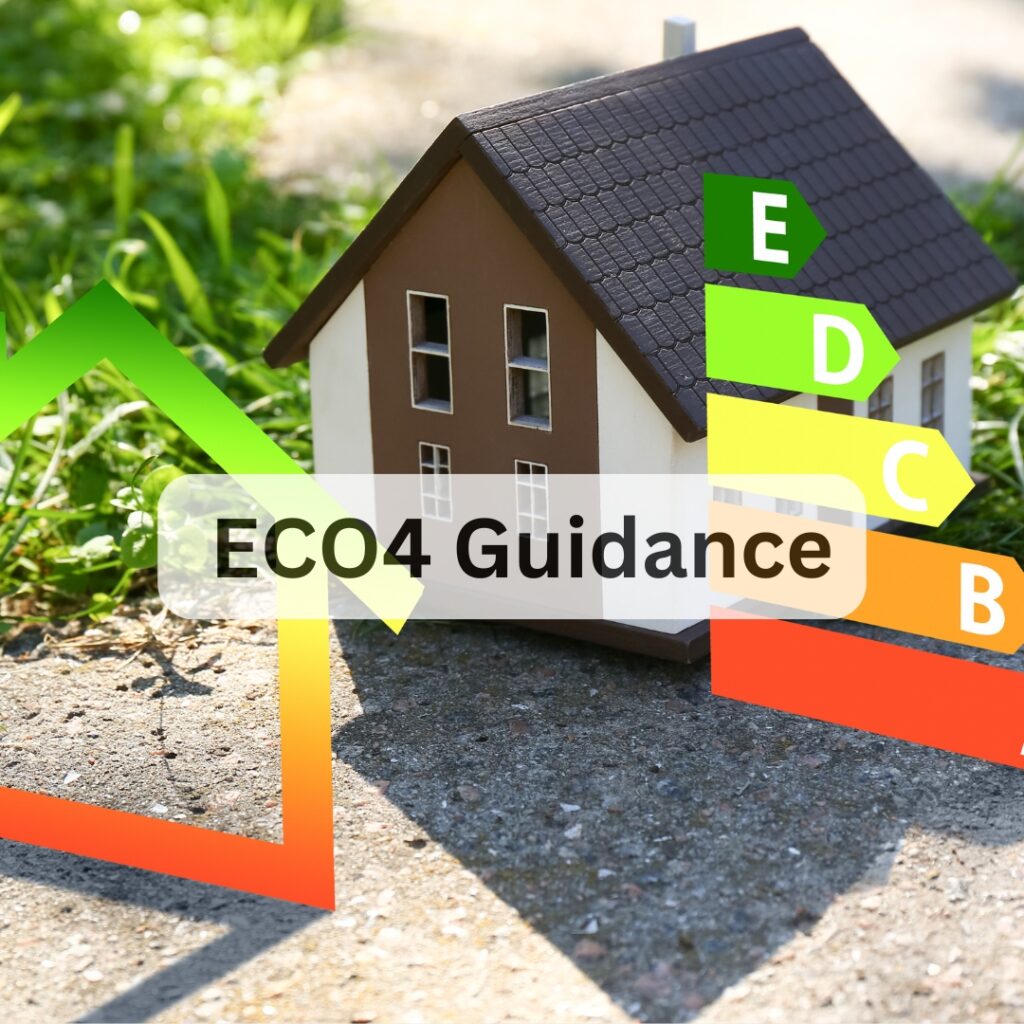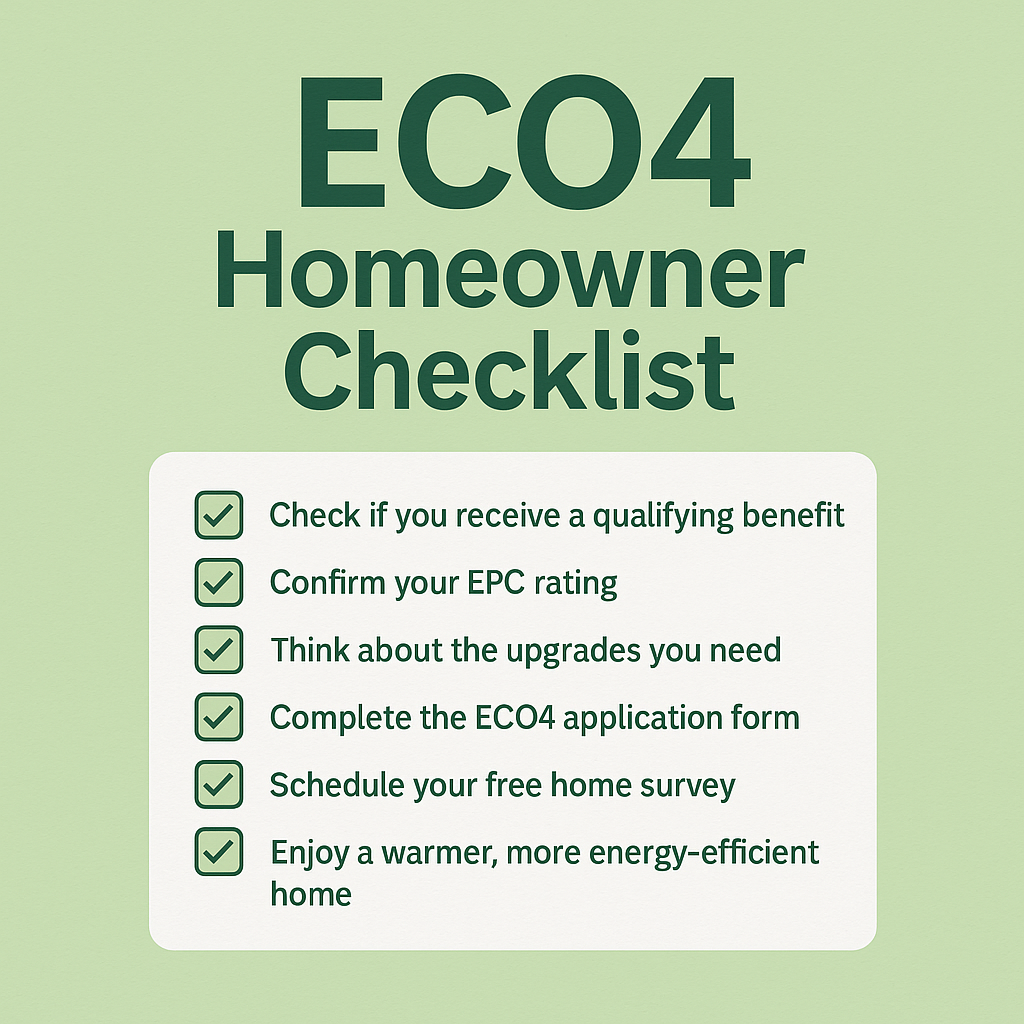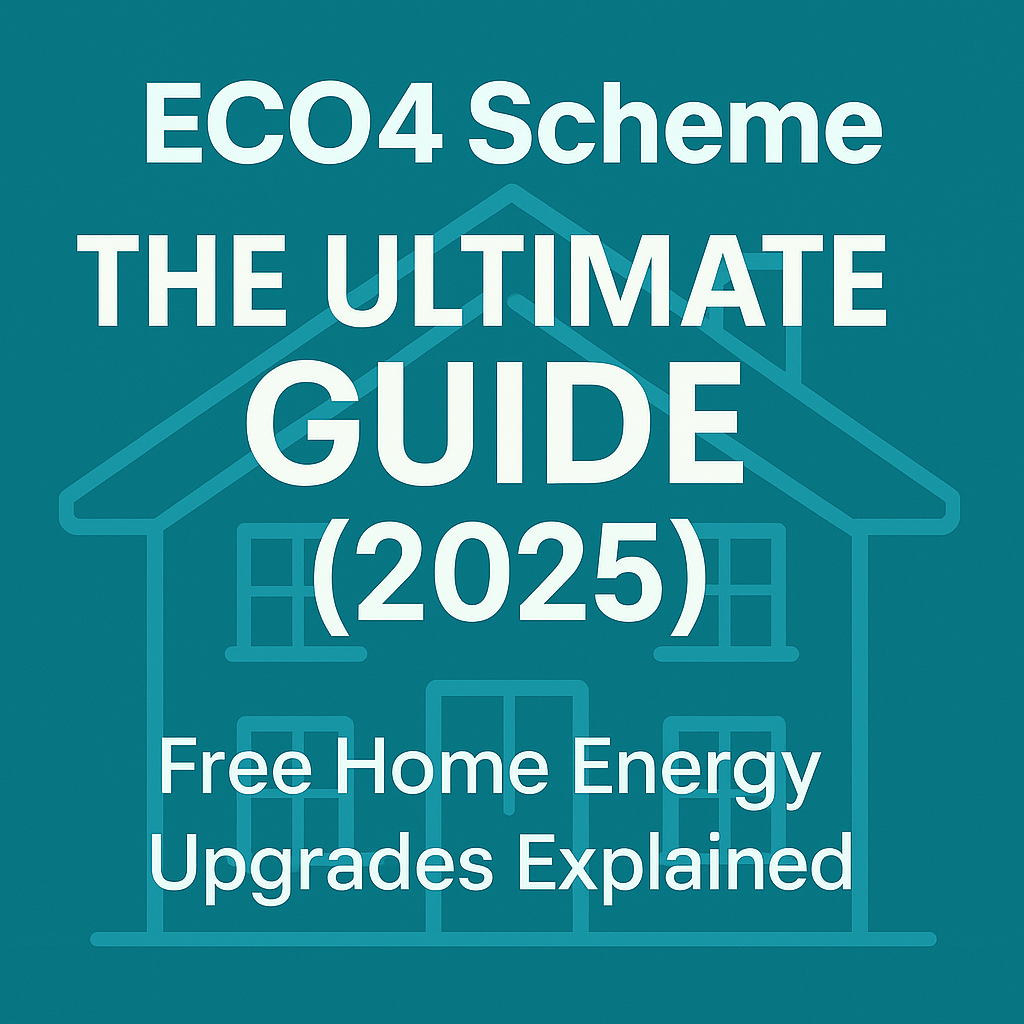Navigating the complexities of energy efficiency schemes can often be challenging, but understanding the key elements of the fourth Energy Company Obligation (ECO4) guidance can provide significant benefits for both suppliers and households. The ECO4 scheme aims to lower fuel poverty and reduce carbon emissions in the UK by supporting home energy efficiency improvements. Knowing how to meet the obligations under ECO4 helps ensure that all stakeholders properly implement eligible measures and secure necessary funding.

The guidance covers various aspects including eligibility criteria, measure and project processes, and compliance regulations. It also places emphasis on the roles and responsibilities of the involved parties, from energy suppliers to broader supply-chain stakeholders. This structured approach is designed to maximise the efficiency and impact of the scheme, benefitting households with lower energy costs and contributing towards national sustainability goals.
Additionally, the funding and necessary measures under ECO4 are carefully monitored to align with policies aimed at decarbonising the housing stock. By gaining a comprehensive understanding of the ECO4 guidance, we can ensure effective engagement with relevant stakeholders and successful implementation of energy-saving measures. This not only aids in achieving broader energy efficiency targets but also provides tangible benefits to the communities involved.
Key Takeaways
- ECO4 aims to reduce fuel poverty and lower carbon emissions in the UK.
- The guidance covers eligibility, roles, compliance, and financial aspects.
- Engaging stakeholders properly ensures the successful implementation of the scheme.
Understanding ECO4
ECO4 is the latest iteration of the Energy Company Obligation, aiming to enhance energy efficiency in low-income and vulnerable households. We’ll explore its evolution, core objectives, and key changes from previous versions.
The Evolution from ECO to ECO4
We have seen the Energy Company Obligation (ECO) evolve through several phases since its inception. Initially, ECO focused on reducing carbon emissions and energy usage. Over time, the program shifted to address fuel poverty by targeting low-income and vulnerable households.
ECO4 represents the fourth phase, incorporating improvements based on previous feedback and performance reviews. This iteration continues to support key energy-saving measures while enhancing criteria to better identify eligible homes and households. For more detailed insights into specific energy-saving measures like solar panels, you can refer to ECO4 Scheme Solar Panels.
Core Objectives of ECO4
Our primary objective with ECO4 is to improve energy efficiency across the UK. We specifically focus on households facing fuel poverty, ensuring they have access to essential energy-saving measures. By targeting low-income and vulnerable populations, ECO4 aims to reduce energy bills and make homes warmer and healthier.
This phase also aligns with broader environmental goals by helping to decrease overall carbon emissions. Furthermore, we seek to create a sustainable future by promoting the use of renewable energy sources and advanced energy-saving technologies.
Key Changes and Differences
ECO4 introduces several significant changes compared to its predecessors. One of the key changes involves updated eligibility criteria. This aims to better identify and assist the most vulnerable and fuel-poor households.
Additionally, there is a streamlined approach to energy efficiency measures. We also include new innovations and flexible options for suppliers to meet their targets. These updates ensure that the scheme remains effective and relevant in the context of current energy challenges. By refining the approach and introducing new methodologies, ECO4 aims to deliver more targeted and impactful results.
Eligibility and Scope
The ECO4 scheme outlines specific criteria for the eligibility of homes and households, focusing on supporting vulnerable groups and addressing fuel poverty. Understanding these requirements is essential for stakeholders.
Qualifying Homes and Households
The ECO4 scheme targets homes that need energy efficiency improvements. Eligible properties must typically be owner-occupied or rented from private landlords. Social housing is generally excluded unless it meets specific criteria.
To qualify, homes often need an energy efficiency rating of D, E, F, or G. These ratings ensure that the focus remains on properties most in need of energy efficiency upgrades. Both single and multi-family units may qualify, and various measures can be implemented to improve their energy performance.
In addition, eligibility is contingent on the household’s occupancy status. Only households with occupants can benefit from the scheme.
Criteria for Vulnerable Households
Certain criteria are in place to identify vulnerable households that qualify for the ECO4 scheme. These include households with elderly members, children, or those with disabilities. Supporting vulnerable groups helps to reduce the risk of fuel poverty and associated health issues.
We have established specific benchmarks to assess vulnerability, such as receiving qualifying benefits or allowances like Pension Credit, Child Tax Credit, or Universal Credit. These benefits indicate a household’s greater need for support.
Local authorities and other authorised bodies can also identify households as vulnerable based on additional criteria, ensuring that no at-risk group is overlooked.
Fuel Poverty and Low-Income Parameters
Fuel poverty affects many households, and the ECO4 scheme aims to tackle this issue by improving energy efficiency. Households are considered fuel-poor if they cannot afford to heat their homes adequately. This is often due to a combination of high energy costs and low incomes.
Low-income parameters are essential for determining eligibility. Households that earn below a certain threshold or rely heavily on energy-related benefits qualify under ECO4. These thresholds are periodically reviewed to adapt to changing economic conditions and ensure that support reaches those who need it most.
By addressing fuel poverty, we aim to enhance living conditions and reduce energy bills for struggling households. This ensures a fairer, more sustainable approach to energy consumption.
Roles and Responsibilities
Our focus here is on the key players involved in the ECO4 scheme, specifically the obligated energy suppliers, local authorities working with ECO4 Flex, and the oversight and administration mechanisms.
Obligated Energy Suppliers
Obligated energy suppliers have a mandate to reduce heating costs for low-income and vulnerable households. They achieve this by implementing a range of energy efficiency and heating measures. These suppliers must meet precise obligations through structured phases, each with set deadlines.
Suppliers are required to ensure the eligibility of homes and households for different energy efficiency measures. They must also comply with stringent installation standards. This meticulous approach is crucial for ensuring the success of the scheme and the proper use of resources.
Local Authorities and ECO4 Flex
Local Authorities play a pivotal role in the ECO4 scheme, especially within the ECO4 Flex programme. They identify eligible low-income and vulnerable households and collaborate with obligated suppliers to implement necessary measures. Their responsibilities include assessing and validating households that meet the criteria for energy efficiency improvements.
Through ECO4 Flex, local authorities have the flexibility to prioritise measures most pertinent to their specific communities. This tailored approach allows for a more effective and targeted delivery of heating and energy efficiency improvements. It’s essential for local authorities to maintain accurate records and provide regular updates to ensure transparency and accountability.
Oversight and Administration
The oversight and administration of the ECO4 scheme are primarily handled by Ofgem, which acts as the scheme administrator. Ofgem’s role includes approving projects, validating eligibility criteria, and ensuring compliance with the scheme’s regulations. This administrative body also manages the reporting and auditing processes to ensure that all parties adhere to the outlined obligations.
Regular audits and stringent monitoring are conducted to ensure integrity and transparency. Clear communication channels are established between Ofgem, suppliers, and local authorities to facilitate smooth operations. Effective administration is vital for the successful implementation of the ECO4 scheme, ensuring that objectives are met and resources are optimally utilised.
Regulations and Compliance
In the context of the ECO4 scheme, regulations and compliance play a crucial role in ensuring energy efficiency targets are met. This includes setting minimum energy efficiency standards, monitoring compliance through reporting and evaluation, and enforcing penalties for non-compliance.
Minimum Energy Efficiency Standards
Under ECO4, we are obligated to adhere to stringent minimum energy efficiency standards. These standards help improve the energy efficiency of housing, particularly for low-income households. Compliance with these standards often involves measures like insulation, heating upgrades, and renewable energy integration.
Energy Performance Certificates (EPC) are used to assess and certify these standards. Houses in bands E, F, and G must undergo significant improvements to meet minimum criteria. The importance lies in ensuring that suppliers meet these energy efficiency benchmarks to contribute towards national energy-saving goals.
Monitoring, Reporting, and Evaluation
Monitoring and reporting are essential for the transparency and accountability of the ECO4 scheme. Regular evaluation reports document the progress of energy efficiency measures and their impact on housing. We implement a comprehensive system for collecting data on energy performance, which is then analysed to inform policy adjustments.
Suppliers must submit detailed reports outlining the measures taken, along with evidence of improvements. The effectiveness of these efforts is assessed through independent evaluations, ensuring all parties meet their obligations. This systematic approach helps in maintaining high standards and identifying areas for improvement.
Non-Compliance and Sanctions
Non-compliance with ECO4 regulations can result in significant penalties. We have established a Supplier Buy-Out Mechanism for companies that fail to meet their targets, offering a financial alternative. This mechanism serves as both an incentive for compliance and a deterrent against negligence.
Sanctions may include fines, mandatory corrective actions, or even restrictions on future participation in the scheme. By strictly enforcing these penalties, we ensure that suppliers remain committed to achieving the specified energy efficiency goals. This rigorous compliance framework ultimately supports the broader objective of reducing carbon emissions and improving energy sustainability.
Funding and Financial Aspects
In this section, we will explore the critical financial elements underpinning the ECO4 scheme. We’ll cover the availability of grant funding and support, the buy-out mechanism for suppliers, and various financial incentives and uplifts designed to encourage compliance and efficiency improvements.
Grant Funding and Support
Grant funding forms a significant part of the ECO4 initiative, providing crucial financial support to suppliers and the supply chain. Under ECO4, grants are allocated to help suppliers meet their obligations by improving energy efficiency in eligible homes. The scheme prioritises low-income households and vulnerable customers, aiming to enhance their living conditions and reduce energy bills.
Eligible measures include insulation, heating improvements, and renewable energy installations. We encourage suppliers to leverage available grants to maximise the benefits for their customers. Securing grant funding involves meeting specific eligibility criteria and successfully submitting detailed applications.
Buy-Out Mechanism for Suppliers
The buy-out mechanism offers a financial alternative for suppliers who cannot meet their obligations through direct energy efficiency measures. By paying into a buy-out fund, suppliers can comply with their ECO4 responsibilities when faced with insurmountable challenges. This mechanism ensures flexibility within the scheme while maintaining accountability across the industry.
Funds collected through the buy-out mechanism are reinvested in broader energy efficiency projects, ensuring continued progress towards national targets. This approach provides a safety net for suppliers and helps to sustain momentum in improving overall energy efficiency across the housing stock.
Financial Incentives and Uplifts
Various financial incentives and uplifts are integrated into the ECO4 scheme to motivate suppliers and enhance efficiency outcomes. These incentives come in the form of additional funding or higher scores for implementing certain measures. For instance, installing more complex or impactful energy-saving solutions might attract higher financial uplifts than simpler measures.
Uplifts particularly favour innovative solutions and measures targeting the most energy-inefficient homes. By strategically applying these incentives, suppliers can not only fulfil their regulatory obligations but also achieve greater efficiency and cost-effectiveness. This aspect of the ECO4 scheme plays a pivotal role in encouraging suppliers to adopt comprehensive and effective energy-saving strategies.
Stakeholder Engagement and Partnering
Engaging with stakeholders is critical for the successful implementation of the ECO4 scheme. We focus on collaboration with local authorities, involvement of consumer groups, and engaging energy efficiency stakeholders to ensure the scheme’s objectives are met effectively.
Collaboration with Local Authorities
Our partnership with local authorities is essential. Local authorities, along with the Scottish and Welsh governments, play a voluntary yet pivotal role in ECO4 Flex. They help identify eligible households and target support towards vulnerable and fuel-poor communities. The eligible pool includes at least 3.5 million homes, ensuring extensive coverage for those in need.
Local authorities assist in the administration and management of the scheme, ensuring adherence to guidelines and compliance standards. Their local knowledge and community presence allow for tailored interventions that reduce fuel poverty and carbon emissions effectively. Our collaboration ensures that the needs of the community are met, and resources are allocated efficiently.
Involvement of Consumer Groups
We actively involve consumer groups to address the concerns and needs of end-users. These groups provide valuable insights into the experiences and challenges faced by households benefiting from the ECO4 scheme. Their feedback helps us refine our approaches to make the scheme more effective and user-friendly.
Consumer groups also play a crucial role in fraud prevention and compliance. By participating in committees, they help identify potential risks and develop mitigating actions. Engaging with these groups enhances transparency and builds trust between us, the consumers, and other stakeholders, ensuring that the scheme maintains its integrity and achieves its goals.
Engaging Energy Efficiency Stakeholders
Engaging with energy efficiency stakeholders, including installers, manufacturers, and the supply chain, is vital for the success of the ECO4 scheme. These partners contribute to the implementation and delivery of various energy efficiency measures. They ensure the right technologies and materials are available and properly installed in eligible homes.
We also consult with academic groups to incorporate the latest research and innovations in energy efficiency. This collaboration ensures that the measures applied are not only compliant with the ECO4 Delivery Guidance but also effective in reducing energy consumption and carbon emissions. By working closely with these stakeholders, we can continuously improve the quality and impact of our interventions.
Supporting Information
Understanding the essentials of ECO4 guidance is crucial for participants, including suppliers, landlords, and software developers. Below, we outline vital resources, detailed guidance on delivery, and where participants can find technical and software support.
Guidance Documentation and Resources
Our ECO4 Delivery Guidance outlines the responsibilities of suppliers and the broader supply chain. This comprehensive document contains vital information on meeting supplier obligations, eligibility criteria for households, and permissible energy efficiency measures.
For those seeking deeper insights, the guidance includes appendices with supporting details that facilitate smoother implementation. Additionally, related documents, such as the ECO Flex targeting methods, offer further strategic information to help application processes.
ECO4 Delivery Guidance for Participants
Participants, including installers and landlords, must closely follow the ECO4 delivery methods to ensure compliance and maximise benefits. The ECO4 Guidance on Delivery specifies the processes for installing eligible measures and the requirements for flex administration.
It is essential to adhere to the installation procedures and documentation standards to qualify for incentives. Regular updates to the guidance, such as those reflected in Version 2.0, are particularly important for maintaining current standards and adjusting to regulatory changes.
Accessing Technical and Software Support
The ECO4 scheme often requires robust technical and software support to aid in effective implementation. Participants can access technical assistance through Ofgem’s dedicated support channels. These resources help in navigating complex compliance requirements and ensuring the software used meets all regulatory standards.
Software developers working with ECO4 can find specific guidelines within the documentation to ensure their tools are compatible and effective. Frequent communication with the ECO team can also provide additional insights and troubleshooting assistance. The goal is to secure a seamless operational experience for all stakeholders involved.
Future Development and Strategic Direction
We must anticipate significant advancements and changes in the ECO4 scheme, with a focus on regulatory updates and integration of innovative measures to enhance energy efficiency.
Incorporating New Measures and Products
The ECO4 scheme aims to integrate a range of new measures and products to improve energy efficiency. Innovation Measures, such as advanced insulation and high-efficiency heating systems, are key focus areas.
We will also see Data Light Measures being utilised to streamline the process of assessing and implementing these improvements. With the inclusion of Alternative Methodology, the goal is to ensure that even non-traditional approaches to energy savings can be validated and adopted.
Legislation and Policy Outlook
Future policies surrounding ECO4 will likely be influenced by upcoming primary legislation. The government’s commitment to its net-zero goals by 2050 will necessitate stricter energy efficiency standards.
Primary Legislation relevant to ECO4 includes mandates on carbon emissions and building energy performance. Additionally, regulations may emerge around Demonstration Actions to validate the effectiveness of new technologies in real-world conditions. This evolution in policy will shape the strategic direction and priorities of the scheme.
Consultation and Impact Assessment
Continuous consultation with stakeholders is pivotal for refining the ECO4 scheme. Ongoing feedback from energy suppliers, the supply chain, and the public will inform future adjustments and enhancements.
Impact Assessments will be conducted to evaluate the effectiveness of current ECO Measures and ECO4 Measures. This will involve reviewing energy savings, cost-effectiveness, and customer impacts. By incorporating comprehensive feedback and rigorous assessment, we can ensure that the scheme effectively addresses energy efficiency and fuel poverty reduction objectives.
Our focus remains on delivering initiatives that provide tangible benefits while aligning with the broader sustainability agenda.
Frequently Asked Questions
In this section, we address common queries regarding the ECO4 scheme, covering eligibility criteria, local authority impacts, updates in guidance, required documents for compliance, health eligibility criteria, and available assistance for understanding the scheme.
What are the eligibility criteria for the ECO4 scheme?
The ECO4 scheme targets households that are vulnerable or have low incomes. Eligible homes must be owner-occupied, privately rented, or living in social housing with an EPC rating of E, F, or G. Households receiving specific benefits or identified as fuel poor by local authorities may also qualify.
How does the local authority administration impact ECO4 implementation?
Local authorities play a crucial role by identifying eligible households and providing referrals. Their involvement ensures that the benefits of the scheme reach the most vulnerable groups. This partnership aids in accurate targeting and efficient delivery of energy efficiency measures.
What updates are included in version 2 of the ECO4 guidance?
Version 2 of the ECO4 guidance includes detailed criteria for eligible measures and streamlined processes for suppliers. It clarifies the roles of various stakeholders within the supply chain and introduces new reporting requirements to enhance transparency and efficiency.
What documents are required for compliance with the ECO4 scheme?
Suppliers and installers must provide detailed documentation including proof of eligibility, completed installation records, and evidence of compliance with technical standards. This documentation ensures accountability and proper tracking of improvements made under the ECO4 scheme.
How can a household qualify for ECO4 under health eligibility criteria?
Households with residents suffering from specific health conditions that are exacerbated by cold living conditions may qualify for the scheme. A referral from a GP, including the resident’s name, address, health condition, and necessary signatures, is required for validation.
What assistance is available for understanding the ECO4 scheme?
For advice on energy efficiency and information on the ECO4 scheme, residents in England and Wales can visit the Simple Energy Advice website. In Scotland, the Home Energy Scotland (HES) helpline provides impartial energy efficiency advice.



